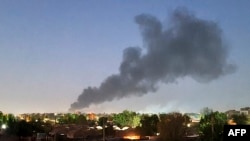The analysts said at the very least, such sanctions only frustrate actors and disrupts the flow of capital being used in fanning the flames in the conflict.
On Thursday, U.S. President Joe Biden signed an executive order imposing sanctions on individuals involved in the recent upheaval and undermining efforts toward a democratic transition in Sudan.
The Associated Press reported that the Biden administration has not decided whether sanctions will apply to Gen. Abdel-Fattah al-Burhan, leader of the armed forces, or the Rapid Support Forces' paramilitary group's leader, Gen. Mohamed Hamdan Dagalo.
The White House said the measures have become necessary because of the October 2021 military takeover and the April fighting which it said "constitute an unusual and extraordinary threat to the national security and foreign policy of the United States."
Shewit Woldemichael, the International Crisis Group's senior analyst for Sudan, told VOA that sanctions on the northeastern African nation have only pushed citizens further into poverty with little to no success in bringing the desired results.
"Sudan and its leaders have been under sanctions for decades. It only made the country and its people poor while the leaders found other means to make and keep their profits," she said. "If this sanction works for the intended purpose, I’ll be very surprised (because) there are few instances sanctions have worked."
Declan Galvin of Nairobi-based risk advisory company WS Insight told VOA that considering the humanitarian, geopolitical or diplomatic perspectives of the situation in Sudan, not only is the step by the U.S. unsurprising, "many of its allies" may begin to take similar actions.
"Given this context and that this has become a full blown diplomatic crisis, it's not surprising that the U.S. and likely many of its allies will follow suit and begin to lay down a framework or other instruments to sanction anybody who's exacerbating or perpetuating that conflict," he said.
But he thinks that the sanctions will "fall short" of halting the conflict and "roll back what’s becoming a humanitarian emergency."
"What the sanctions do allow is for the U.S. or other of its allies to begin putting pressure on any external forces which might be either benefiting from this particular conflict or otherwise exacerbating it for one reason or another," Galvin added.
"When you target individuals and make it difficult for them to be able to move capital out of a country or across borders, that is something that brings a lot of consternation and a lot of it is about frustrating them and trying to make sure that other people don’t go down the same pathway."
He continued, "and that is helpful. But in terms of resolving the current crisis, there's going to need to be a lot more diplomatic and legal maneuverings to bring that to fruition," he said noting there are not "shining examples" of how sanctions have helped resolve conflicts on the continent.
United Nations agencies say the conflict has killed more than 500 people, including civilians while thousands more continue to flee to neighboring countries.





![Analysis: US Sanctions Persons Destabilizing Sudan [3:50]](https://gdb.voanews.com/01000000-0aff-0242-f0a6-08db4677a47c_w33_r1.jpg)


